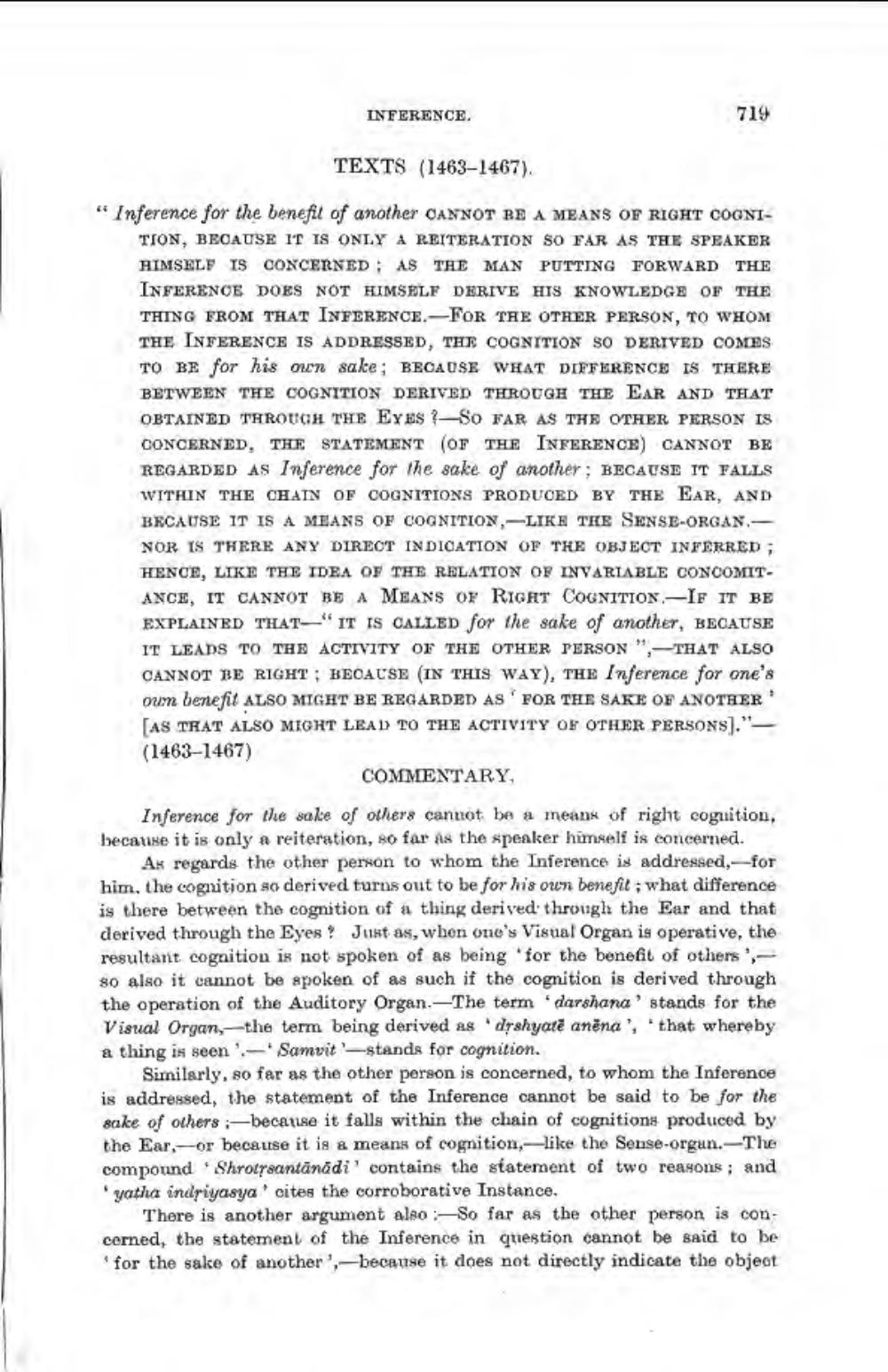________________
INFERENCE
719
TEXTS (1463-1467).
* Inference for the benefit of another CANNOT BE A MEANS OF RIGHT COGNI
TION, BECAUSE IT IS ONLY A REITERATION SO FAR AS THE SPEAKER HIMSELF IS CONCERNED; AS THE MAN PUTTING FORWARD THE INFERENCE DOES NOT HIMSELF DERIVE HIS KNOWLEDGE OF THE THING FROM THAT INFERENCE.-FOR TRE OTHER PERSON, TO WHOM THE INFERENCE IS ADDRESSED, THE COGNITION SO DERIVED COMES TO BE for his own sake; BECAUSE WHAT DIFFERENCE IS THERE BETWEEN THE COGNITION DERIVED THROUGH THE EAR AND THAT OBTAINED THROUGH THE Eyes 1-SO FAR AS THE OTHER PERSON IS CONCERNED, THE STATEMENT OF THE INFERENCE) CANNOT BE REGARDED AS Inference for the sake of another; BECAUSE IT FALLS WITHIN THE CHAIN OF COGNITIONS PRODUCED BY THE EAR, AND BECAUSE IT IS A MEANS OF COGNITION,-LIKE THE SENSE-ORGAN NOR IS THERE ANY DIRECT INDICATION OF THE OBJECT INFERRED ; HENCE, LIKE THE IDEA OF THE RELATION OF INVARIABLE CONCOMITANCE, IT CANNOT BE A MEANS OF RIGHT COGNITION-IF IT BE EXPLAINED THAT—"IT IS CALLED for the sake of another, BECAUSE IT LEADS TO THE ACTIVITY OF THE OTHER PERSON", --THAT ALSO CANNOT BE RIGHT : BECAUSE IN THIS WAY), THE Inference for one's oum benefit ALSO MIGHT BE REGARDED AS 'FOR THE SAKE OF ANOTHER LAS TRAT ALSO MIGHT LEAD TO THE ACTIVITY OF OTHER PERSONS)." (1463-1467)
COMMENTARY
Inference for the sake of others cannot be a means of right coguition, because it is only a reiteration, so far as the speaker himself is concerned.
As regards the other person to whom the Inference is addressed, for him, the cognition so derived turns out to be for his own benefit ; what difference is there between the cognition of a thing derived through the Ear and that derived through the Eyes? Just as, when one's Visual Organ is operative, the resultant cognition is not spoken of as being for the benefit of others, so also it cannot be spoken of as such if the cognition is derived through the operation of the Auditory Organ.—The term 'darshana' stands for the Visual Organ, the term being derived as dyshyatë anëna', that whereby a thing is seen'.- Samvit'--stands for cognition.
Similarly, so far as the other person is concerned, to whom the Inference is addressed, the statement of the Inference cannot be said to be for the sake of others because it falls within the chain of cognitione produced by the Ear,-or because it is a means of cognition, like the Sense-orgun.-The compound Shrotrsantānādi' contains the statement of two reasons; and yatha indriyasya.cites the corroborative Instance,
There is another argument also —So far as the other person is concerned, the statement of the Inference in question cannot be said to be for the sake of another, because it does not directly indicate the object




